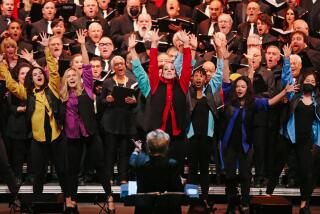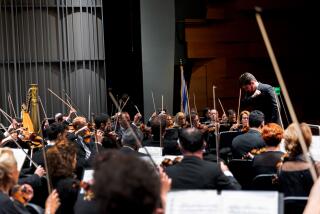Calling of the Cantor : Judaism’s Prayer Leaders Perform Dual Roles
- Share via
When Arie Shikler was growing up in the Tel Aviv suburb of Ramat Gan, his musical tastes ran to Elvis and the Beatles. Except on Friday afternoons, when he and his father would listen to the haunting, soothing chants over the radio of cantors marking the Sabbath.
By 1970, Shikler, who had moved to California and tried to earn a living as a musician in folk and blues clubs, would find himself chanting the same prayers almost by accident.
Needing a job and still struggling with English, he interviewed at Congregation Shir Ha Ma’alot in Newport Beach to teach Hebrew or art. But the rabbi needed a cantor, and that’s what he became.
It opened up a new world for the once-secular Jew, both spiritually and practically. He now follows Judaism’s ancient rituals--keeping a kosher kitchen and fasting during Yom Kippur, the Day of Atonement. He considers his religion as food for the soul.
“When I became a cantor, it became for me a spiritual escape,” he said. “All of a sudden, I discovered my religion and realized how much I had missed it. . . . Judaism is like a great kitchen without a menu. Every time I go to the fridge, I find something else that I like.”
Singing in Hebrew, cantors issue their prayers with haunting melodies reminiscent of Arabic music; their chants carry hints of the music sung by monks in the medieval Catholic Church.
Though often trained as entertainers, cantors play a serious role in synagogues. Not only do they sing or chant prayers from the Torah, cantors also are members of the clergy with religious responsibilities.
Opera singers, teachers and others drawn to music need to find their faith to play the role, experts said.
“If they do not believe, they’re not cantors,” said cantor Abraham Shapiro, a Conservative Jew who is executive administrator of the Cantors Assembly, the largest association for cantors in the world.
*
Many cantors, like Shikler, say discovering their calling meant rediscovering their spiritual roots.
It happened to opera singer Josef Chazan, now cantor at Congregation Eilat in Mission Viejo, when he left Israel in 1973.
“I grew up in a very Orthodox family and went to a yeshiva school,” he said. “I moved away from it when I grew older, but I got involved again when I came here, because I wanted my children to know where they were from.”
Chazan started at the Conservative Mission Viejo congregation as a vacation replacement and took over the full-time position a few years later.
Although Chazan continues to perform secular music from time to time, he said that his work as a cantor has been more fulfilling.
“In the theater, when the show is over, it’s over,” he said. “But here you reach people in a different way. It’s a good feeling.”
Shula Kalir-Merton also found satisfaction when she gave up her job as a teacher to become a cantor at Temple Beth El, a Reform congregation in Aliso Viejo.
“It’s been a love match from the beginning,” she said. “The minute that I started being a cantor, I knew that this was meant to be.”
The role goes beyond that of a musician, said Shapiro of the cantors association; Judaism recognizes a dual role of cantors in the ministry.
“We are more than singers,” Shapiro said. “We are clergy.”
*
Indeed, cantors were the only clergy Jews had when they first arrived in the United States.
“In the 1840s, there were no rabbis in America,” said Jonathan Serna, who teaches Jewish history at Brandeis University in Massachusetts. “The greatest cantors took their leadership very seriously.”
With the lack of rabbis, cantors joined couples in marriage, prayed over funeral ceremonies and led the the Sabbath service. That role has changed little. Cantors regularly take over the service when the rabbi is absent.
“If you are recognized as the temple’s cantor, you can handle all pastoral duties,” said former opera singer Jonathan Grant, now cantor at Temple Bat Yahm in Irvine. “Most people see the rabbi as the spiritual leader of the congregation and the cantor as the musical leader. But the lines do cross and they cross more and more.”
Tustin’s Conservative Congregation B’nai Israel has done without a cantor for 18 years. But with the completion of a new synagogue just around the corner, Rabbi Elie Spitz hopes to change that soon.
“We will probably start interviewing in the fall,” Spitz said. “But the question is what kind of cantor we want. A performance, operatic-style cantor or a folk singer, who may not have the most beautiful voice, but can carry a tune. The operatic one would be excellent, if their mind-set in praying is right.”
Some want to become cantors to stand in the limelight and not to inspire others in their prayers, Spitz said.
*
All three main branches of Judaism in America--Orthodox, Reform and Conservative--use cantors, but use of cantors in Orthodox congregations is declining, experts say. None of the Orthodox congregations in Orange County, for example, have a cantor.
“I personally don’t enjoy having someone pray for me,” said Rabbi Joel Landau at Beth Jacob Congregation of Irvine. “Judaism is a full-contact sport, not a spectator sport. It’s the difference between creating an atmosphere to bond with God or sit there and yawn.”
Their religious duties don’t stop the musicians from expressing their natural talents.
Shikler chose popular show tunes as the theme for this year’s temple fund-raising concert and invited cantor colleagues Shula Kalir-Merton and Mark Thompson as well as the congregation’s choir leader Nancy Linder to share the stage on Sunday.
“I’m doing a song that I never did before,” Shikler said. “Sinatra’s ‘I Did It My Way,’ which I can identify with very much.”
More to Read
Sign up for Essential California
The most important California stories and recommendations in your inbox every morning.
You may occasionally receive promotional content from the Los Angeles Times.













